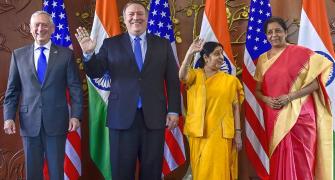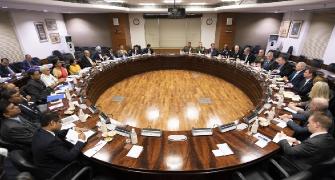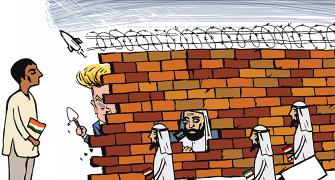
India and the United States have agreed to accelerate their defence and security ties as Defence Minister Nirmala Sitharaman and her American counterpart James Mattis reviewed ongoing initiatives to further strengthen bilateral defence cooperation as a 'key pillar' of the strategic partnership.
US Defence Secretary Mattis, who welcomed Sitharaman to the Pentagon on Monday for the fourth set of talks between them this year, described India as a 'stabilising force' across the Indo-Pacific and the globe.
"The United States and India, in Prime Minister (Narendra) Modi's words, have overcome hesitations of history, carrying forward the legacy of friendship and making clear there is no contradiction between strategic autonomy and strategic partnership," Mattis said.
The two leaders discussed the growing partnership between India and US in the defence sphere and also exchanged views on a broad range of bilateral and international issues of mutual interest, said an official statement in New Delhi.
"They reviewed ongoing initiatives to further strengthen bilateral defence cooperation as a key pillar of the strategic partnership between India and the US," it said.
"Both sides agreed to further strengthen bilateral defence cooperation, building on the discussions and outcomes of the '2 + 2 Dialogue' held in September 2018," the statement added.
She also highlighted the steps taken by India to promote defence sector manufacturing under the government's 'Make in India' flagship programme, it said.
Mattis said the US-India relationship is a natural partnership between the world's oldest and the world's largest democracy.
"We have made meaningful progress in advancing US-India defence cooperation, most notably with your nation hosting September's inaugural '2+2' ministerial dialogue in New Delhi," he said.
The ministerial talks served as a tangible demonstration of 'our shared vision for a safe, secure, prosperous and free Indo-Pacific, underpinned by respect for the sovereignty and the territorial integrity of all nations', Mattis said.
"Today, I reiterate US appreciation for India's leadership as a stabilising force in pursuit of that vision, promoting peace and security across the region and the globe," he said.
The defence secretary said the '2+2 Dialogue' also made clear the commitment of India and the US to further bolster their defence partnership.
"Today, we build on that momentum as we work to implement our agreement from September, Communications Compatibility and Security Agreement (COMCASA)," he added.
During the dialogue, the two nations signed the COMCASA that allows India to receive advanced US military hardware. Describing the '2+2' meeting as a landmark event, Sitharaman said it set the stage for strategic consultations between the two countries.
In her remarks at the start of the meeting with Mattis, Sitharaman said the mutual trust and confidence in defence partnership between the two countries was growing.
She added that she was encouraged by the importance attached to the India-US defence relationship in the new US National Security Strategy.
"A strong foundation has been laid for the India-US defence relationship over the years. India sees the US as an important partner in defence," Sitharaman said, adding that the two countries have good military-to-military cooperation, defence consultations, scientific collaborations and co-production and co-development and industry collaboration.
Exuding confidence that the bilateral talks would accord greater momentum to the dialogue and partnership between the two countries, she said the relationship continued to be very strong.
The recent high-level exchanges are an indication of the depth and the quality of bilateral ties as well as the two sides' mutual desire to work closely on a range of regional and global issues, she added.
Sitharaman appreciated the responsiveness of the Trump Administration to India's sensitivities.
At the same time, it is also indicative of the desire and the effort to have an even more robust relationship than before, she said.
"Especially over the past three to four years, we have made considerable progress.
"Our relations, based on common democratic values, enjoy strong political and popular support in both countries. There's a growing mutual trust and also the confidence in defence partnership, which augurs very well for the future," she said.
Sitharaman started her official visit in Washington, DC, by visiting the State Department, where she signed condolence book for former US president George H W Bush.
From there, she drove to the Arlington National Cemetery where she laid a wreath at the Tomb of the Unknown Soldier, a gesture which did not go unnoticed at the Pentagon.
"On behalf of our department and all of our service members, thank you for paying your nation's respect at Arlington National Cemetery this morning. We're grateful," Mattis said.
Mattis said Sitharaman's presence at the wreath-laying made clear that the US-India military relations were not 'defined by brittle or empty words' but by the human aspect of partnership steeped in recognition of the two nations' respective sacrifices and the cause of peace, friendship and freedom.
Sitharaman, the first woman defence minister of India, is currently on a five-day trip to the US.
From Washington, she will travel to California to visit the Defense Innovation Unit of the Department of Defense and the Indo-Pacific Command headquarters in Hawaii.









